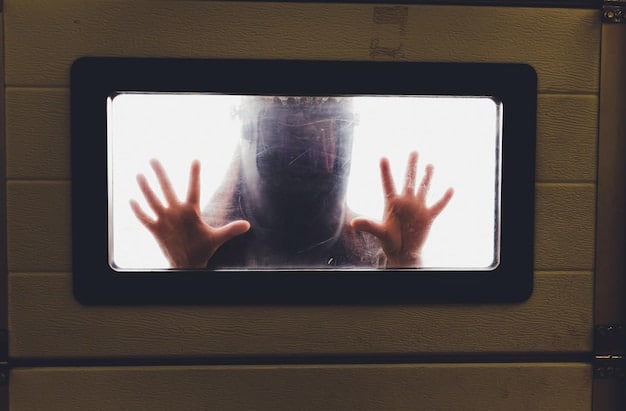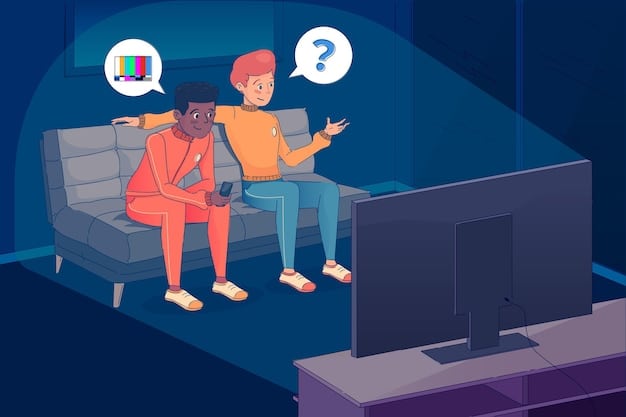Dubbing vs Subtitles: Which Is Best for US Viewers of International Crime Dramas?

For US viewers of international crime dramas, the choice between dubbing and subtitles hinges on balancing linguistic authenticity with ease of comprehension, with subtitles generally favored for preserving the original performances and cultural nuances, while dubbing offers a more relaxed viewing experience.
Diving into the world of international crime dramas can be incredibly rewarding, offering unique perspectives and thrilling storylines. But, as a US viewer, you’re faced with a key decision: is dubbing or subtitles better for understanding international crime dramas? A US viewer’s guide is what you need to navigate this choice.
Unlocking Global Crime: Dubbing vs. Subtitles
When you’re settling in for a night of gripping international crime dramas, one of the first choices you’ll face is whether to watch with dubbing or subtitles. Both options aim to bridge the language gap, letting you enjoy shows from around the world. But each has its own strengths and drawbacks that can significantly affect your viewing experience.
The Subtitle Advantage: Authenticity and Immersion
Subtitles provide a direct translation of the original dialogue. This maintains the actors’ performances and the original soundscape of the show, allowing viewers to connect more deeply with the cultural nuances and unique linguistic styles.
The Dubbing Appeal: Effortless Viewing
Dubbing replaces the original audio with a translated version spoken by voice actors. This eliminates the need to read along, allowing viewers to focus solely on the visuals and action unfolding on screen. It can offer a more relaxed and less demanding viewing experience.

The crucial aspect to consider is how deeply you want to immerse yourself in the original presentation versus how much you value a comfortable viewing experience. Subtitles require more focus, but many find they provide a more authentic connection.
Cultural Nuances and Linguistic Authenticity
One of the prime appeals of delving into international crime dramas is the opportunity to experience different cultures and perspectives. Subtitles often excel in preserving these subtle, yet critical, elements that can be lost in translation with dubbing.
Subtitles offer a window into the show’s culture. They allow you to pick up on slang, idioms, and speech patterns unique to the area. This connection to cultural elements gives you a more robust understanding of the context.
- Preservation of Original Performances: You hear the actor’s voice, intonations, and emotional delivery, preserving the integrity of their performance.
- Exposure to Authentic Language: Subtitles help you get a feel for the rhythm and structure of the original language, even without understanding it fluently.
- Understanding Cultural Idioms: Subtitles can provide a direct translation for cultural references and idioms, giving you insights into the cultural context of the scene.
Consider watching a show from Italy, for example. The way characters argue and the specific insults they use might be rooted deeply in Italian culture. Subtitles can convey these subtle cultural cues far more effectively than a dubbed version.
Ease of Viewing and Accessibility
While subtitles are often valued for their accuracy, dubbing offers the advantage of ease and accessibility. For viewers who prefer a more passive viewing experience, or who might struggle with reading subtitles quickly, dubbing can be a great alternative.
Accessibility is key to watch enjoyment. Those with reading disabilities may find it tough to watch subtitled programs. Dubbing would be the better viewing experience for them.

Dubbing: A More Relaxed Experience
Dubbing takes away some of the attention needed from you watching a show. You can focus more on what is going on screen and less on reading the words.
Subtitles: A More Involved Watch
Subtitles require focus. This can be distracting to some users. However, others may enjoy the focus.
- Multitasking Potential: When you don’t have to read subtitles, you may find it easier to do other things while watching.
- Focus on Visuals: Dubbing allows you to concentrate entirely on the visual elements of the show, appreciating the cinematography and production design.
- Accessibility for All: Some may find it easier to understand shows by hearing it in their own language, which can make international content far more accessible.
If you’re looking to unwind after a long day, or perhaps want to watch a show while completing simple tasks around the house, dubbing might be the easier choice. Also, many people that speak multiple languages may find dubbing easier to follow. Ultimately, the decision rests on whether you’d prefer a smooth, laid-back experience.
Lost in Translation: The Pitfalls of Each Method
Both dubbing and subtitles have their shortcomings. Subtitles can distract viewers from fully experiencing the visuals. Dubbing sometimes can’t fully capture vocal performances.
It’s essential to be aware of what can be lost or altered in the process of translation, regardless of which method you choose.
The trade-off lies in deciding what aspects of the original show you value most.
- Subtitle Speed: Fast paced shows are hard to read along with.
- Dubbing Inaccuracy: Translators sometimes make mistakes.
- Cultural Misinterpretation: Some cultural references might be lost during dubbing.
A common complaint about dubbing is that the voice acting doesn’t always match the actors on-screen. With subtitles, some viewers miss important scenery or visual details. Both methods have drawbacks.
The Impact on E-E-A-T for Content Consumption
Experience, Expertise, Authoritativeness, and Trustworthiness (E-E-A-T) impact your content choice, and this applies directly to choosing between dubbing and subtitles. Your choice has real implications. Here is why.
The method you pick will influence your experience with the international crime show. Each decision presents a unique situation.
The decision will vary from person to person.
Personal Experience Improves Content Choices
Your prior knowledge and preferences will always shape your experience in media. Prior experiences will help guide content decisions.
Expertise Matters
Expertise is the reason people pick certain shows. Ratings, reviews, and recommendations help drive content decisions.
Prioritizing media content that builds on these elements will ensure a more enriching E-E-A-T framework.
Making an Informed Decision for Your Viewing Pleasure
In the end, the choice between dubbing and subtitles comes down to personal preference and what you hope to gain from watching international crime dramas. There is no right or wrong answer – just options that better suit your viewing habits and priorities.
Some factors can help you make a final decision.
Keep these thoughts in mind while you make decisions.
- Evaluate Your Priorities: Consider the factors described earlier to decide what matters most.
- Consider the Show: Some shows work better with subtitles, some with dubbing.
- Try Both: Experiment to see what works best.
So, the next time you’re browsing through international crime dramas, take a moment to weigh the options. By making an informed decision, you can ensure that your journey into global crime is as enjoyable and enriching as possible.
| Key Aspect | Brief Description |
|---|---|
| 🗣️ Authenticity | Subtitles preserve original performances and cultural nuances. |
| 👓 Ease of Viewing | Dubbing allows focus on visuals without reading, offering a more relaxed experience. |
| 🌍 Cultural Context | Subtitles offer a deeper understanding of cultural idioms and linguistic styles. |
| ✅ Accessibility | Dubbing enhances accessibility for viewers who prefer not to read subtitles. |
Frequently Asked Questions
▼
Not necessarily; the accuracy depends on the quality of the translation and the dubbing team’s attention to detail. However, dubbing often involves more adaptation to fit lip movements, which can sometimes alter the original meaning.
▼
Yes, watching shows with subtitles in the language you’re learning is a great way to improve your vocabulary and get a feel for the language’s rhythm and structure in a real-world context.
▼
Yes, this allows you to compare the interpretations and catch any nuances you might have missed in either version. It can also enhance your understanding of both the original language and the cultural context.
▼
It often depends on the target audience and market. Dubbing tends to be favored in regions where viewers are less accustomed to reading subtitles, while subtitles are common in markets that value authenticity.
▼
Try adjusting the subtitle settings (size, color, background) to make them less intrusive. Also, practice focusing on the visuals while still glancing at the subtitles, which can improve your reading speed over time.
Conclusion
Ultimately, the choice between subtitles and dubbing depends on your personal preferences and what you value most in your viewing experience. Whether you prioritize authenticity and linguistic nuance or prefer a more relaxed and accessible experience, there’s a way to enjoy the rich world of international crime dramas.





